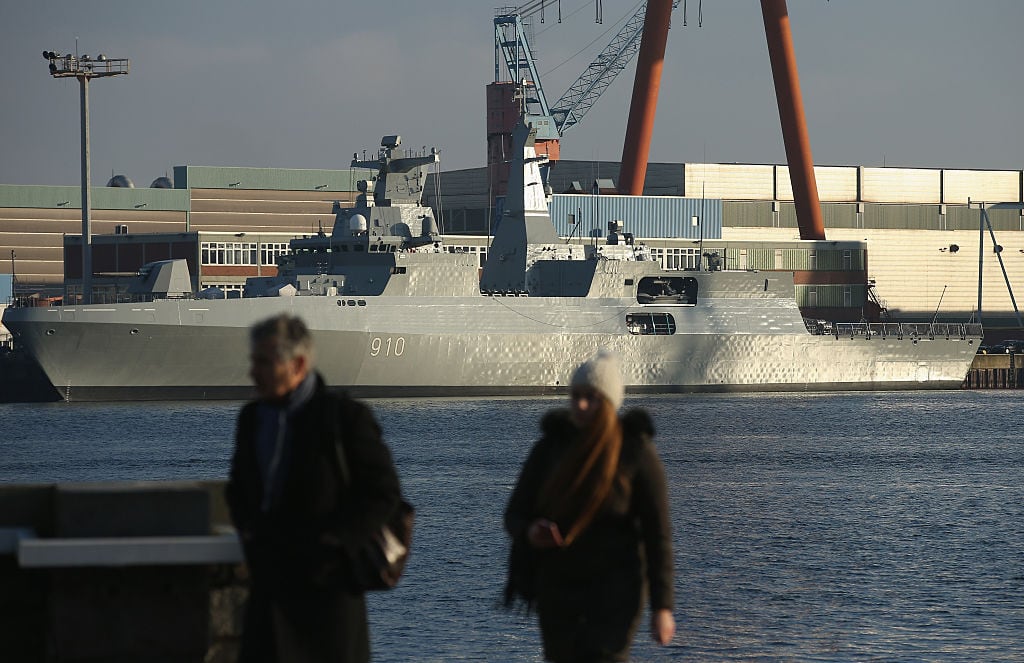COLOGNE, Germany – German shipbuilding advocates are pressing the government to insulate the military surface ship sector from international competition in a bid to boost the industry segment here.
At issue are thousands of jobs in northern Germany, plus, proponents contend, a capability sector so critical to national security that it deserves an exemption from European acquisition requirements.
The campaign is expected to pick up steam as a key naval program, the MKS-180 multirole frigate, proceeds toward a second call for offers by the German Ministry of Defense later this year. Up for grabs is a $4 billion deal to build an initial batch of four ships.
The two contenders are a Dutch-led team headed by Damen Shipyards and one led by German Naval Yards Kiel, which is owned by a French-Lebanese investor. Both bids have German firms as partners: Lürssen's subsidiary Blohm+Voss in the case of Damen, and ThyssenKrupp Marine Systems with GNYK.
Daniel Günther, the minister-president of Germany's northernmost state Schleswig-Holstein, which includes the city of Kiel, was the latest to demand special treatment for German shipyards.
Günther told the German press agency DPA he is rooting for the German Naval Yards bid because his state, which hosts both shipyards comprising the team, stands to benefit from the work. “It's important for me that the contract goes to Schleswig-Holstein, and that's why I use all opportunities to lobby for it in Berlin – though it's still on the companies to put together a good offer,” he was quoted as telling the German press agency DPA.
RELATED

But besides the customary parochial interests at play, the national security-related argument cited by those favoring a domestic advantage remains murky. It comes down to the interpretation of the term “key technology,” and whether the surface shipbuilding segment is covered by the definition.
Günther, like other advocates, pointed to the coalition agreement forged earlier this year between the Christian Democratic Union and the Social Democrats, which states that above-water shipbuilding would be labeled a “key technology.”
What proponents fail to mention, however, is that the relevant passage is contained in a chapter covering civilian economic objectives for the new government. As for military applications, the coalition agreement defers to a 2015 strategy document by the Defense Ministry, which weights key technologies differently.
According to that document, only the construction of submarines is considered a key technology in the shipbuilding arena; surface ships are to be sourced Europe-wide.
For now, defense officials are sticking to that interpretation. A solo bid for MKS-180 by ThyssenKrupp Marine Systems was turned down by government analysts earlier this year, sending shockwaves through a company not used to rejection, local media reported. Appeals for the ministry to rethink its decision based on the need to protect domestic firms fell on deaf ears, with government sources insisting that protectionism would play no role whatsoever in an eventual award.
Meanwhile, the battle over the “key technology” status for surface shipbuilding is far from over. And while it’s unclear whether the government is open to revisiting its 2015 classification scheme anytime soon, the MKS-180 program is expected to move forward based on the original European-wide tender that includes Damen as one of the contenders still in the race.
ThyssenKrupp, for its part, is not taking any chances. Once counted out of the race, executives this month announced an agreement to act as a second-tier partner to German Naval Yards, portraying the arrangement as the most German offering of them all.
Sebastian Sprenger is associate editor for Europe at Defense News, reporting on the state of the defense market in the region, and on U.S.-Europe cooperation and multi-national investments in defense and global security. Previously he served as managing editor for Defense News. He is based in Cologne, Germany.








